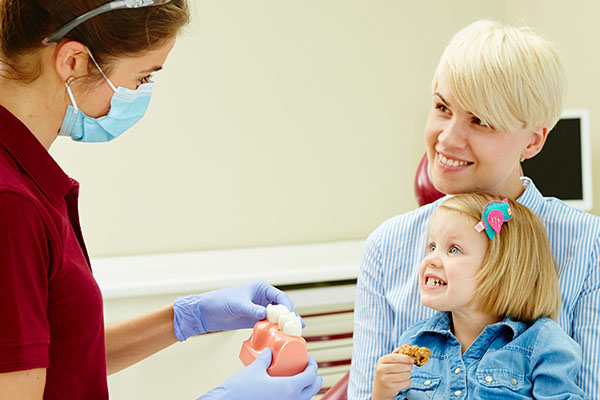 Fluoride is a naturally occurring mineral that plays an important role in pediatric dentistry. When applied topically, it can strengthen tooth enamel by remineralizing teeth. As a result, teeth are better protected against tooth decay and cavities. It can be difficult to consume enough fluoride naturally through your diet, but it is so beneficial to oral health that it is now added to most public water supplies. Still, dentists often recommend incorporating also it into daily cleaning routines and biannual checkups for added dental protection.
Fluoride is a naturally occurring mineral that plays an important role in pediatric dentistry. When applied topically, it can strengthen tooth enamel by remineralizing teeth. As a result, teeth are better protected against tooth decay and cavities. It can be difficult to consume enough fluoride naturally through your diet, but it is so beneficial to oral health that it is now added to most public water supplies. Still, dentists often recommend incorporating also it into daily cleaning routines and biannual checkups for added dental protection.
Fluoride uses for pediatric patients
There are many ways a dentist may incorporate fluoride into your child’s plan of care. Some are used routinely while others are reserved for occasional treatment as needed.
Fluoride varnishes
At the end of a dental checkup, a dentist may recommend the application of topical fluoride varnish. This solution is brushed onto the surfaces of the teeth and sets almost instantly. Patients should not eat for half an hour so the varnish can cure. Then, it remains on the teeth until it is brushed off either at bedtime or the next morning. When fluoride rests on the tooth’s surface for an extended period of time, the enamel can absorb more of it, giving teeth an extra boost of anti-cavity protection.
Silver diamine fluoride
It is possible to avoid fillings in some situations when tooth decay has just begun to set in. Pediatric dentistry professionals can apply silver diamine fluoride to the area. This solution has antimicrobial properties to neutralize the bacteria that cause tooth decay, while the fluoride strengthens tooth enamel to prevent more erosion at the site. While it is only a temporary solution, it can prevent a serious cavity from forming in a baby tooth until it falls out or until the child is able to tolerate the necessary dental work. Excellent home care and limiting sugary and acidic foods are necessary for the treatment to maintain its efficacy.
Fluoride toothpaste recommendations for children
It is important to note that while fluoride use supports overall oral health, too much of it can have adverse effects. Children who use excessive amounts of fluoride toothpaste at a young age can develop a condition called fluorosis, the discoloration of the permanent teeth before they erupt above the gun line. More importantly, swallowing fluoride toothpaste can lead to stomach pain and may even cause intestinal blockage in both children and adults. For this reason, babies and young children who cannot yet control their swallowing reflexes should stick to a fluoride-free toothpaste. Once children can brush, rinse, and spit without swallowing, apply only an amount the size of a single grain of rice to their toothbrush. As their permanent teeth come in and their mouth develops and grows, a pea-sized amount of fluoride toothpaste is all that is needed.
Conclusion
When used properly, fluoride can help prevent tooth decay and cavities in patients of all ages. Pediatric dentistry professionals often recommend topical applications at routine checkups. Daily use of fluoride toothpaste when your child is ready can also protect their teeth and gums.
Request an appointment or call Hudson Valley Pediatric Dentistry at 845-363-4177 for an appointment in our Middletown office.
Recent Posts
Curious about how often you should take your child to see a pediatric dentist? Read on to learn more. It is a common misconception that small children do not need to see a dentist since their baby teeth will fall out eventually. However, a number of difficulties may arise with a person's dental health at…
Cavities, or dental caries, can affect children just as they do adults, and early cavity treatment for kids is crucial to prevent further dental problems.The process of cavity treatment for kids is tailored to their unique needs and comfort. In this article, we will walk patients through the typical steps of cavity treatment for children,…
Are you wondering how often your child should see a pediatric dentist? Both children and adults should visit the dentist at least twice a year to ensure that their teeth and gums are healthy. However, seeing a pediatric dentist more often than that can be helpful to a growing child.A child’s mouth undergoes many changes…


